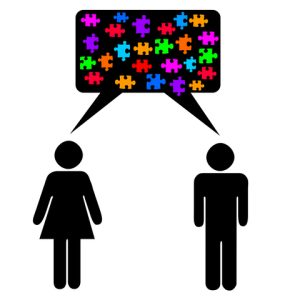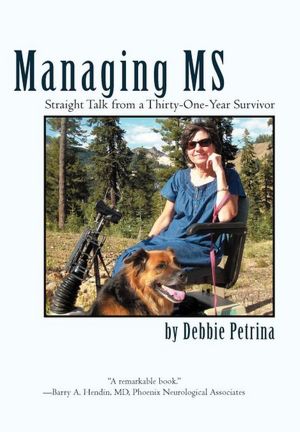 “Strategies & Tips”
“Strategies & Tips”
On February 15th, I facilitated a workshop entitled “MS and Your Relationships” in Phoenix. The workshop was part of Genzyme’s One Day for Every Day Event. This is a summary of that workshop, as I want to share this information with a larger audience.
I began by telling the attendees that a one-hour timeframe was not enough for this big, important subject. It’s bad enough that everything about MS is complex, from the diagnosis to the symptoms; after all, the nervous system is involved. But people are highly complex too because of their thoughts and emotions. So when you put the two subjects together—yikes!!
Just about everyone in the room with MS was there with someone else—either a spouse, sibling or friend. This was good because everyone living with the MSer is also living with MS. And that goes beyond the immediate family.
My presentation was to discuss communication strategies and tips to create a foundation of open and honest communication. I adjusted this goal to first, make the group interactive, and second, address two other critical aspects of relationships: support and knowledge.
• Support and knowledge reduce the fear one has with an MS diagnosis. The more you have of both, the better chance you have to survive this disease. One has to be careful though where one gets the knowledge since because of social media, there is much information available today that can be overwhelming and inaccurate.
• Since MS is still a lifetime illness, knowledge and support will change many times as time marches on due to disease progression and lifetime changes that will occur.
• Everyone in the room needs it; everyone outside the room needs it. What is NOT a strategy? Doing nothing—doing no communicating, obtaining no knowledge, getting no support. Anyone dealing with MS will not survive it if none of these are done.
Who are the relationships the person with MS interacts with? What do we say to whom? Who do need support from?
• Family: partners, children, parents, siblings (Needs communication at appropriate level; “show & tell” is a great game to play to help a non-MSer understand invisible symptoms. For example, have men walk in spike heels to understand balance issues; put 10-lb, weights around ankles to experience walking heaviness and fatigue; put a knit glove on a person and have them find objects in a purse like tissue, quarters, etc.)
• Friends (How much you share depends on depth/closeness of friends.)
• Workplace people: boss, colleagues, human resources (very subjective area—many reasons to disclose or not to disclose)
What groups were missing from the power point slide in the presentation that are just as important?
• Peers (They are a lifeline for both MSers and non-MSers—someone you can easily relate to because they are “in your shoes.”)
• Healthcare team (Make sure all of them understand and have experience with persons with MS! For example, a physical therapist needs to understand the effects of heat and fatigue of MS. Also, you need to like and trust your neurologist; if you don’t, fire him/her and get another one, as this is a lifetime, crucial relationship.)
• Strangers (I have had to ask strangers for help many times since I had mobility problems since my early years. For example, helping me reach something in a grocery store, or assisting me in a dressing room. People in general–in all of the above groups too–like and want to help. It makes them feel good, and they hate to see someone struggle. Personally, I will let people help even if I don’t necessarily need it!)
• Pets (Wow—they understand/comfort us the most, don’t they?!)
I had all eyes on me from my audience, and many nods or claps. It was interesting to see hands go up when I asked how many felt they needed better support in various groups or who didn’t like their neurologist.
Talk is good, even if it doesn’t solve anything. It feels good to get things off our chest. I have an old MS buddy who called me recently and asked, “Can you talk to me? Is this a good time?” But if there is someone like a stranger or a fellow employee who asks you something that you don’t want to talk about, just simply say: “It’s a long story…”
Venting is also good, as long as it doesn’t hurt anyone. For example, when I get stressed out or frustrated, I cry or call a close friend of mine who is a peer. My husband on the other hand will yell or throw things in an un-harmful way. We go our separate ways to vent because I don’t like his yelling, and he doesn’t like my crying. When the steam is released from the pressure cooker, everything calms down. Holding things inside without a release is dangerously stressful, and we all know how stress negatively affects MS.
What if the people we need to talk with will not communicate or talk? Then it is essential to find someone who will…
In the beginning of my MS, my family was in denial. I went straight to the local chapter of the National MS Society to get literature and meet others who had MS. Later, when both my husband and my mother wouldn’t talk to me about my MS, I went to a therapist who understood MS to help myself deal with these two close people in my life. Years later, I went to a therapist again when deciding whether to give up my career. My MS was aggressive and it was progressing rapidly.
There’s no question that people living with a person with a chronic illness such as MS, is also living with it too. While open communication is essential for all involved, it unfortunately doesn’t always happen effectively without having an “outside” person/s involved. Perceptions are different, emotions are involved, and more often than not, negative consequences result. Ideally, partner/family counseling is essential in most cases.
Realistically, there are obstacles with professional counseling. The first is that many people–whether they have the illness or not–do not want to go to counseling. This was the case in my own personal situation and though I pleaded with my family to go, it didn’t happen. So I went to counseling on my own and fortunately, it helped me tremendously to figure out how to handle my family relationships and how and where I could get support that I needed. Secondly, I believe it is imperative that a good, reputable therapist who UNDERSTANDS MS is found. MS is complicated in many ways, is generally progressive, and currently lasts a lifetime. Finally, many people unfortunately cannot afford therapy; however, many county health departments have resources available for financially strapped people.
So what are strategies to foster healthy communication?
• Should you always be honest about your feelings? When I asked everyone in the room if they were ever dishonest about their feelings, every single hand went up! It obviously is a judgment call, depending upon the people involved, and their personalities. With your healthcare team, you need to be honest. With everyone else, the group agreed that you can’t be a constant complainer or whiner. Be selective with whom you are comfortable with and trust to discuss your concerns, problems, fears, etc.
• Keep a journal about important things that need to be communicated, whether it is info to discuss with your doctor, modifications that need to be made at work, or just notes about what you want to talk about.
• Pick an appropriate time and place for a discussion. Trying to talk when one is tired, hungry, or stressed out will be a disaster. Try to be in a relaxed frame of mind, when interruptions will not occur.
• Be respectful of what the other person is saying—this is a two-way conversation. Actively listen to each other, and avoid accusations, finger pointing, name calling, yelling, etc. How and what we say matters, as well as the tone that we use. Avoid negativity.
• Two-thirds of communication occurs through body language. Your posture, facial expressions, eye contact, etc. speaks volumes. When someone rolls their eyes or points a finger at you, what does that indicate?
• Ask for help and ask to help. People want to help, and people need help. Be explicit or give examples when talking about this to help clarify your statements. Ask questions and share perspectives. Try to put yourself in the other person’s shoes. And remember—none of us are mind readers. Not only are you communicating here, you are educating.
• Everyone should show and express their gratitude often. Give complements.
• A hug, kiss or smile goes a long way.
• From experience, I believe that we MSers set the tone and comfort level. If we are relaxed and open, the other person will be too.
• My personal advice to all: show and give empathy, not sympathy.
• Use humor when appropriate. Many times, the subject being discussed can be very sensitive and not funny at all. Or, it is hard to be humorous when you are not feeling well.
• Avoid arguing and be patient. If an argument develops or patience is lost, quit the discussion and regroup later.
• Always try. If it doesn’t work, try something else.
Well we ran over our one-hour timeframe, which was no surprise. But it was a start, and I always say that “Getting started with anything is the hard part.” Now everyone has a framework or some ground rules they can try to use to enhance their communication, support and knowledge.
At the conclusion, I gave everyone a copy of a previous blog that I had written entitled “MSers and Their Loved Ones.”
www.DebbieMS.com
Author, MS Counselor/Living with MS
Please visit my website for more articles, videos, my book, MS information and resources.

![]()

 “Strategies & Tips”
“Strategies & Tips”